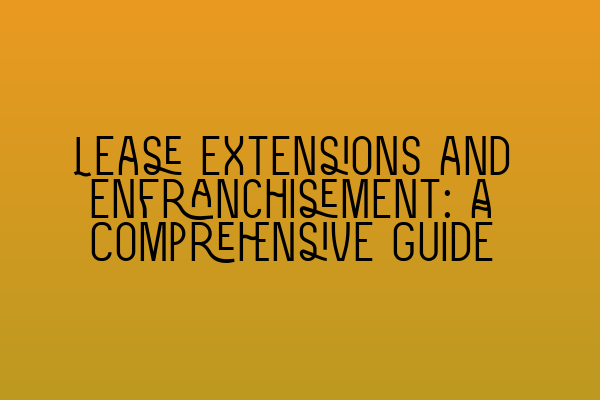Lease Extensions and Enfranchisement: A Comprehensive Guide
Welcome to our comprehensive guide on lease extensions and enfranchisement. As a solicitor specializing in property law at SQE Property Law & Land Law, we understand the complexities and importance of these processes. Whether you are a leaseholder looking to extend your lease or a freeholder seeking to enfranchise a property, this guide will provide you with the necessary information to navigate through the intricacies of lease extensions and enfranchisement.
Before we delve deeper into the details, let’s quickly clarify what lease extensions and enfranchisement mean.
Lease Extension:
A lease extension involves prolonging the length of an existing lease. It allows leaseholders to maintain their stake in a property by extending their lease term, often on mutually agreeable terms with the freeholder. The lease extension process grants leaseholders an opportunity to secure their long-term interest and potentially increase the value of their property.
Enfranchisement:
Enfranchisement refers to the acquisition of the freehold interest in a property by qualifying leaseholders. It allows leaseholders to collectively purchase the freehold of their building, giving them increased control and ownership rights. This process gives leaseholders the power to manage their property as they see fit, including the ability to make decisions regarding service charges, repairs, and other important matters.
Now that we have clarified the basic concepts, let’s explore the key aspects of lease extensions and enfranchisement in more detail:
Lease Extensions:
1. Eligibility Criteria:
To qualify for a lease extension, you must meet certain criteria, such as owning a residential leasehold property for a specified minimum period. Understanding whether you are eligible is crucial before proceeding with the lease extension process.
2. The Lease Extension Process:
The process involves serving a formal notice to your freeholder, stating your intention to extend the lease. You should ensure that the notice complies with the legal requirements, including the prescribed form and content. It is advisable to seek legal advice and engage a solicitor who specializes in lease extensions to assist you throughout the process.
3. Negotiating the Terms:
Once the notice is served, negotiations regarding the terms of the lease extension will commence. This includes determining the premium to be paid to the freeholder, the length of the lease extension, and any other specific provisions that need to be agreed upon. It is essential to have a knowledgeable solicitor by your side to ensure that you secure the most favorable terms possible.
4. Statutory vs. Non-statutory Lease Extensions:
It’s important to note that lease extensions can be either statutory or non-statutory. Statutory lease extensions are governed by specific legislation (such as the Leasehold Reform, Housing, and Urban Development Act 1993) and provide leaseholders with various rights and protections. Non-statutory lease extensions, on the other hand, are negotiated outside of the legislative framework and usually involve more flexibility in terms.
Enfranchisement:
1. Eligibility Criteria:
To qualify for enfranchisement, leaseholders must meet certain criteria, which may include the number of qualifying tenants and the length of time the leaseholders have owned their leases. Understanding whether you meet the eligibility criteria is crucial when considering enfranchisement.
2. The Enfranchisement Process:
Similar to the lease extension process, enfranchisement involves serving a formal notice to the freeholder expressing your intention to purchase the freehold. This notice should comply with legal requirements and be drafted carefully to ensure its validity. Seeking legal advice is highly recommended during this stage.
3. Valuation and Purchase Price:
Once the notice is served, the valuation of the property and determination of the purchase price will commence. It is essential to engage qualified valuers who specialize in enfranchisement to ensure an accurate valuation of the property. The purchase price may include various elements, such as the market value of the freehold, marriage value, and other relevant factors.
4. Financing the Enfranchisement:
Enfranchisement can involve significant financial implications. Leaseholders should explore various financing options, including personal funds, mortgages, or collective funding through leaseholder associations. Understanding the financial aspect of enfranchisement is necessary to plan and budget effectively.
At SQE Property Law & Land Law, we understand the complexities involved in lease extensions and enfranchisement. Our team of experienced solicitors can provide you with the necessary guidance and support throughout the process, ensuring your interests are protected.
If you’re preparing for the SQE exams, check out our related articles:
– SQE 1 Practice Exam Questions: [Link]
– SQE 1 Practice Mocks FLK1 FLK2: [Link]
– SQE 2 Preparation Courses: [Link]
– SQE 1 Preparation Courses: [Link]
– SRA SQE Exam Dates: [Link]
In conclusion, lease extensions and enfranchisement are crucial processes that allow leaseholders to safeguard their interests and gain greater control over their properties. Understanding the eligibility requirements, the processes involved, and working closely with experienced professionals can significantly impact the outcome of your lease extension or enfranchisement journey.
If you require expert advice or legal assistance concerning lease extensions or enfranchisement, feel free to contact SQE Property Law & Land Law. Our dedicated team is ready to assist you throughout the entire process.
Disclaimer: The information provided in this article is for general informational purposes only and does not constitute legal advice. Please consult with a qualified solicitor for advice specific to your situation.
